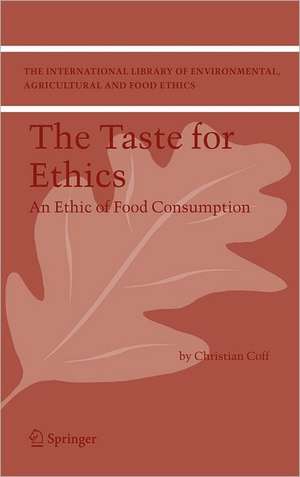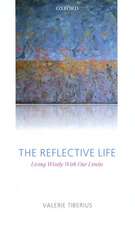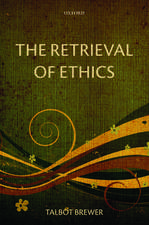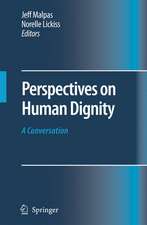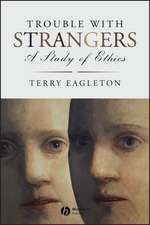The Taste for Ethics: An Ethic of Food Consumption: The International Library of Environmental, Agricultural and Food Ethics, cartea 7
Autor Christian Coffen Limba Engleză Hardback – 14 feb 2006
| Toate formatele și edițiile | Preț | Express |
|---|---|---|
| Paperback (1) | 637.28 lei 43-57 zile | |
| SPRINGER NETHERLANDS – 18 noi 2010 | 637.28 lei 43-57 zile | |
| Hardback (1) | 644.18 lei 43-57 zile | |
| SPRINGER NETHERLANDS – 14 feb 2006 | 644.18 lei 43-57 zile |
Din seria The International Library of Environmental, Agricultural and Food Ethics
- 15%
 Preț: 707.96 lei
Preț: 707.96 lei -
 Preț: 451.76 lei
Preț: 451.76 lei - 18%
 Preț: 731.10 lei
Preț: 731.10 lei - 18%
 Preț: 744.53 lei
Preț: 744.53 lei - 18%
 Preț: 899.87 lei
Preț: 899.87 lei - 18%
 Preț: 1831.27 lei
Preț: 1831.27 lei - 15%
 Preț: 644.82 lei
Preț: 644.82 lei - 15%
 Preț: 643.16 lei
Preț: 643.16 lei - 18%
 Preț: 947.04 lei
Preț: 947.04 lei - 18%
 Preț: 953.20 lei
Preț: 953.20 lei - 15%
 Preț: 646.62 lei
Preț: 646.62 lei - 15%
 Preț: 646.75 lei
Preț: 646.75 lei - 18%
 Preț: 1116.40 lei
Preț: 1116.40 lei - 15%
 Preț: 643.99 lei
Preț: 643.99 lei - 18%
 Preț: 953.65 lei
Preț: 953.65 lei - 15%
 Preț: 645.28 lei
Preț: 645.28 lei - 15%
 Preț: 637.28 lei
Preț: 637.28 lei - 18%
 Preț: 786.66 lei
Preț: 786.66 lei - 15%
 Preț: 644.30 lei
Preț: 644.30 lei -
 Preț: 398.74 lei
Preț: 398.74 lei - 18%
 Preț: 902.69 lei
Preț: 902.69 lei - 24%
 Preț: 697.63 lei
Preț: 697.63 lei -
 Preț: 388.52 lei
Preț: 388.52 lei - 20%
 Preț: 570.97 lei
Preț: 570.97 lei - 18%
 Preț: 784.61 lei
Preț: 784.61 lei - 15%
 Preț: 527.79 lei
Preț: 527.79 lei - 24%
 Preț: 635.50 lei
Preț: 635.50 lei - 15%
 Preț: 647.08 lei
Preț: 647.08 lei
Preț: 644.18 lei
Preț vechi: 757.85 lei
-15% Nou
Puncte Express: 966
Preț estimativ în valută:
123.27€ • 129.02$ • 102.59£
123.27€ • 129.02$ • 102.59£
Carte tipărită la comandă
Livrare economică 31 martie-14 aprilie
Preluare comenzi: 021 569.72.76
Specificații
ISBN-13: 9781402045530
ISBN-10: 1402045530
Pagini: 212
Ilustrații: XIX, 212 p.
Dimensiuni: 160 x 240 x 15 mm
Greutate: 0.52 kg
Ediția:2006
Editura: SPRINGER NETHERLANDS
Colecția Springer
Seria The International Library of Environmental, Agricultural and Food Ethics
Locul publicării:Dordrecht, Netherlands
ISBN-10: 1402045530
Pagini: 212
Ilustrații: XIX, 212 p.
Dimensiuni: 160 x 240 x 15 mm
Greutate: 0.52 kg
Ediția:2006
Editura: SPRINGER NETHERLANDS
Colecția Springer
Seria The International Library of Environmental, Agricultural and Food Ethics
Locul publicării:Dordrecht, Netherlands
Public țintă
ResearchCuprins
I -Food and Ethics.- Eating, Society and Ethics.- II -The Intellectualization of Food.- Food to Science: On the Intellectualization of Food.- The Storylessness of Food.- III - Food Ethics and the Production History.- Tracing the Production History.- Food Ethics as the Ethics of the Trace.- Traceability and Food Ethics.
Recenzii
From the reviews:
“This book makes the case for an ethical understanding of food consumption. Christian Coff notes that a growing number of consumers are making ethics a central part of their food consumption choices. … Coff’s arguments and analyses are very intriguing and convincing. I would recommend this book to anyone who has an interest in understanding the difficult and complex nature of creating an ethical and values-based food system.” (Michael A. Long, Journal of Agricultural and Environmental Ethics, Vol. 22, 2009)
“This book makes the case for an ethical understanding of food consumption. Christian Coff notes that a growing number of consumers are making ethics a central part of their food consumption choices. … Coff’s arguments and analyses are very intriguing and convincing. I would recommend this book to anyone who has an interest in understanding the difficult and complex nature of creating an ethical and values-based food system.” (Michael A. Long, Journal of Agricultural and Environmental Ethics, Vol. 22, 2009)
Textul de pe ultima copertă
This book marks a new departure in ethics. In our culture ethics has first and foremost been a question of ‘the good life’ in relation to other people. Central to this ethic was friendship, inspired by Greek thought, and the caritas concept from the Judaeo-Christian tradition. But no early moral teaching discussed man’s relation to the origin of foodstuffs and the system that produced them; doubtless the question was of little interest since the production path was so short.
Before industrialisation the production of food was easy to follow. As a rule that is no longer the case. The field of ethics must therefore be extended to cover responsibility for the production and choice of foodstuffs, and it is this food ethic that Christian Coff sets out to trace. In doing so he shows how the focus of ethics can be expanded from its concern for the good life with and for others to cover the good life in fair food production practices, and how not least through using our integrity orlife coherence we can reflect ethically, or caringly, about living organisms, ecological systems and our human identity.
From the foreword by Dr. Peter Kemp, Professor of Philosophy at the Danish University of Education
Before industrialisation the production of food was easy to follow. As a rule that is no longer the case. The field of ethics must therefore be extended to cover responsibility for the production and choice of foodstuffs, and it is this food ethic that Christian Coff sets out to trace. In doing so he shows how the focus of ethics can be expanded from its concern for the good life with and for others to cover the good life in fair food production practices, and how not least through using our integrity orlife coherence we can reflect ethically, or caringly, about living organisms, ecological systems and our human identity.
From the foreword by Dr. Peter Kemp, Professor of Philosophy at the Danish University of Education
Caracteristici
Food ethics interpreted through the concepts of 'the production history of food' and traceability Food ethics developed as a narrative, phenomenological, hermeneutic discipline Food ethics developed from the consumer perspective Food ethics considered as a relation to man, society and nature
